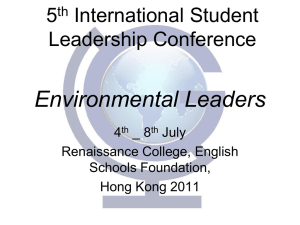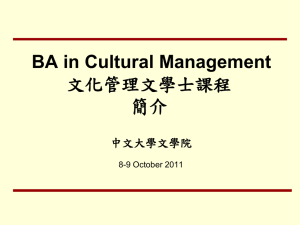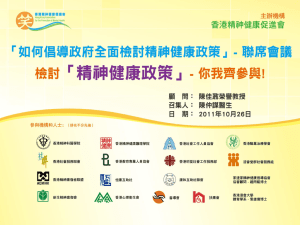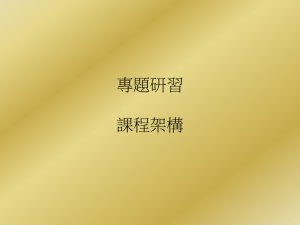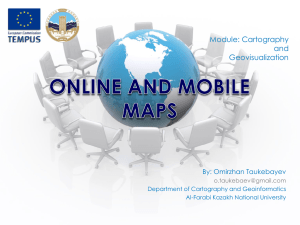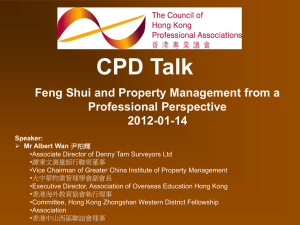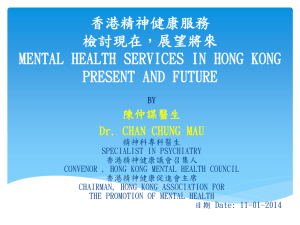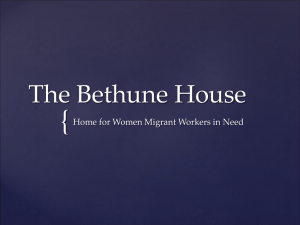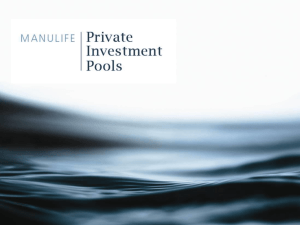3. Composition of insurance industry in Hong Kong
advertisement
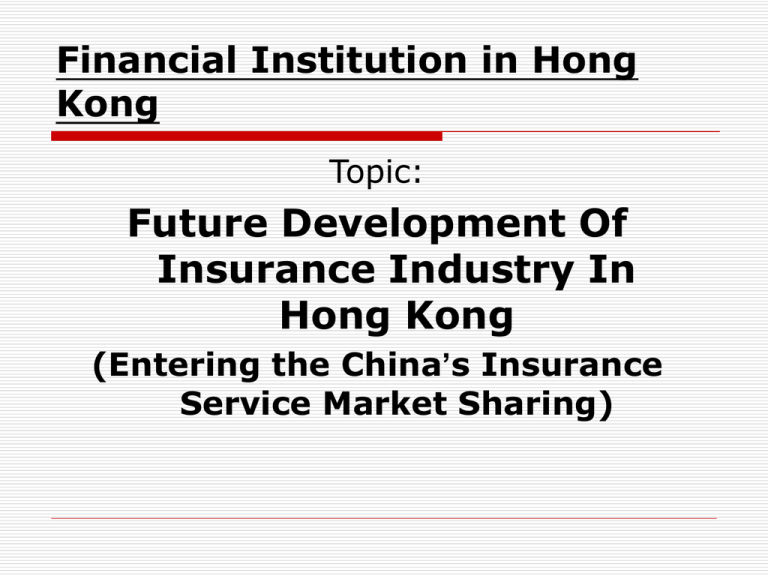
Financial Institution in Hong Kong Topic: Future Development Of Insurance Industry In Hong Kong (Entering the China’s Insurance Service Market Sharing) Group 2 039003 039007 039011 039013 039014 Zenki Yu Jackie Li Oliver Choi Carmen Law Sarah Fu 1. Abstraction the future development of the whole insurance industry in Hong Kong the future development of the particular insurance companies. Manulife Company as an example have a comprehensive understanding for the insurance industry. 2. Introduction of Insurance Industry The Conditions of Existing Insurance Industry Prevent Suffer Loss Diversification of Risk 2. Introduction of Insurance Industry Transaction Cost (Asymmetric Information) Adverse Selection Moral Hazard Specific Hold-ups Takes place after the transaction Happens between clients and insurance companies / agents or brokers and insurance companies 3. Composition of insurance industry in Hong Kong A. The size of insurance business in Hong Kong 2002 2003 HK$m HK$m 2004 HK$m General Business- 23,44 24,766 23,478 Gross Premium 8 Long Term Business-Office Premium 65,51 77,225 98,414 7 Total 88,96 101,99 121,89 5 1 2 3. Composition of insurance industry in Hong Kong 100000 10 90000 9 80000 8 70000 7 60000 6 50000 5 40000 4 30000 3 20000 2 10000 1 0 0 1994 1995 1996 1997 1998 1999 year 2000 2001 2002 2003 2004 General Business Per cent % HK$million P rem ium Long term Business % of GB and LtB in GDP 3. Composition of insurance industry in Hong Kong a. Insurer authorized in Hong Kong and they distributed by types of insurance business and countries of incorporation 11% general business insurers 26% long term business insurers 63% composite insurers 3. Composition of insurance industry in Hong Kong b. The major classes of insurance business and their respective market (For general business) 17% 27% general liability property damage 13% accident and health motor vehicle 19% 24% other 3. Composition of insurance industry in Hong Kong b. The major classes of insurance business and their respective market (For long-term business) 13% 3% indibidual life business retirement scheme management other 84% 3. Composition of insurance industry in Hong Kong individual life policies 100 6000000 90 80 5000000 4000000 Individual life policies 60 50 3000000 40 2000000 30 20 1000000 10 0 0 1994 1995 1996 1997 1998 1999 year 2000 2001 2002 2003 2004 percent % no.of individual 70 % of individual life policies in HK population 3. Composition of insurance industry in Hong Kong B. Manulife’s Financial Highlights a. Total Assets Under Management: Total Assets Under Management 90 80 70 Total Assets Under Manage ment 60 HK$ billions 50 40 30 20 10 0 2000 2001 2002 year 2003 2004 3. Composition of insurance industry in Hong Kong b. Total Premiums and Deposits Total Premiums and Deposits 14 12 10 Total Premiums and Deposits 8 HK$ billions 6 4 2 0 2000 2001 2002 year 2003 2004 3. Composition of insurance industry in Hong Kong c. Benefits Paid Benefits Paid 4 3.5 3 2.5 HK$ billions 2 Benefits Paid 1.5 1 0.5 0 2000 2001 2002 year 2003 2004 3. Composition of insurance industry in Hong Kong d. Policy Dividends Paid Policy Dibidends Paid 800 700 600 500 HK$ billion 400 Policy Dibidends Paid 300 200 100 0 2000 2001 2002 year 2003 2004 3. Composition of insurance industry in Hong Kong e. Number of Individual Policies in Force Number of Individual Policies in Force 1000 900 800 700 600 No. Number of Individual Policies in Force 500 400 300 200 100 0 2000 2001 2002 year 2003 2004 3. Composition of insurance industry in Hong Kong f. Number of Agents Number of Agents 7,000 6,000 5,000 4,000 no. of agents 3,000 Number of Agents 2,000 1,000 0 2000 2001 2002 year 2003 2004 4. Regulations of insurance industry Financial Examination Onsite Inspection Market's Consolidation Actions of Insurance Authority (IA) include: limitation of premium income, restrictions on investments, requirement for a special actuarial investigation Self-Regulatory Initiatives 5. Operations of insurance organization A. Data Collection and Statistical Estimation measure the optimal premium and compensation the Central Limit Theorem set how much is the premium opportunity cost for the policyholder 5. Operations of insurance organization B. Contractual Consideration asymmetric information as well as unexpected risks fulfill the right and duty risk being transferred, diversified or alleviated 6. Case Study of Manulife A. Introduction of Manulife Company Manulife Life Insurance (Hong Kong) Limited "AA+ (Very Strong) by Standard & Poor's www.manulife.com.hk bancassurance alliance with CITIC Ka Wah Bank "Guaranteed Retirement Income Plan" 6. Case Study of Manulife B. Products of Manulife individual insurance, group life & health, wealth management, MPF & Occupational Retirement Schemes Ordinance (ORSO), general insurance, credit cards Personal Life and Health Insurance 6. Case Study of Manulife B. Products of Manulife life insurance is dividend into Whole Life, Term, and Endowment In the policy, there are many information, premium paying period, basic plan premium, interest, etc. 7.Future development A. Hong Kong insurance industry Statistics also indicated strong signs of recovery in the long term business market and general business market According to latest figures: 178 authorized insurers 112 general business insurers 46 long term business insurers 7.Future development A. Hong Kong insurance industry Hong Kong's insurance market has a strong international presence. Over half of the authorized insurers are incorporated outside Hong Kong in 25 different countries. (US companies taking the lead) 7.Future development A. Hong Kong insurance industry China's accession to the World Trade Organization opens up more opportunities for Hong Kong insurers. China's total premium income grew to US$25 billion for 2001, an increase of 32 percent over 2000. 7.Future development A. Hong Kong insurance industry After joining the WTO, China is committed to further widening market access to foreign players, which enables Hong Kong a bigger role to play. Hong Kong is well poised to develop into an important insurance center 7.Future development B. Manulife Future development of Manulife Whisked off five industry awards this year. Came top of its class in a newly introduced MPF Fund category. 7.Future development B. Manulife Developing the china market Continued to expand its operations in China and Hong Kong with the start of operation in cities of Nanjing, Hangzhou and Zhongshan. Official Life Insurance Partner of the 2008 Olympic Games in Beijing 7.Future development B. Manulife Developing a Retirement Plan Services in Hong Kong By the year 2016, more than onethird of Hong Kong’s population will be over fifty years old. retirement planning should be more important helping retiree to make a well management on saving 7.Future development B. Manulife Development on their market share Manulife expects that there will have a well development on market price of their shares. market price reflect the value of its business and its future business prospects represent an attractive investment 8. Conclusion A. Hong Kong insurance industry Helping people to prevent suffer loss and diversify their risk Facing the problems of adverse selection, moral hazard and specific hold-ups Reducing the risks by data collection, statistical estimation and contractual consideration 8. Conclusion Five major classes of business Three kinds of long term business Self-Regulatory Initiatives Spreading its services in China with benefiting China joined the World Trade Organization Developing into an important insurance center 8. Conclusion B. Manulife Operating its business in China like Nanjing, Hangzhou, Zhongshan and so on Increasing the business of Retirement Plan Services because of serious aging problem in Hong Kong Financial Institution in Hong Kong Goal Insurance Service Center

